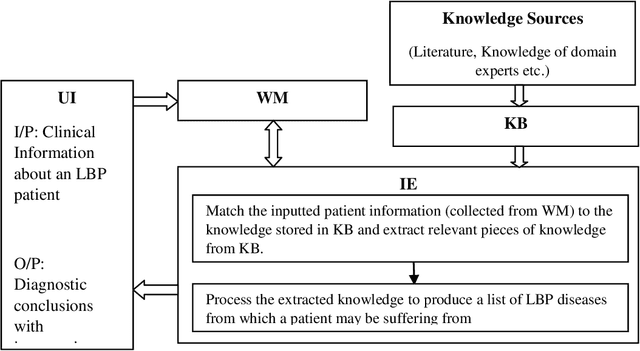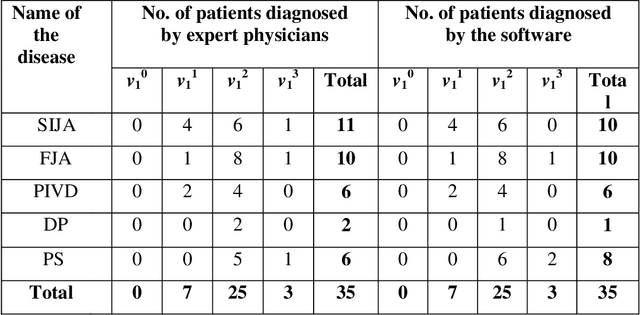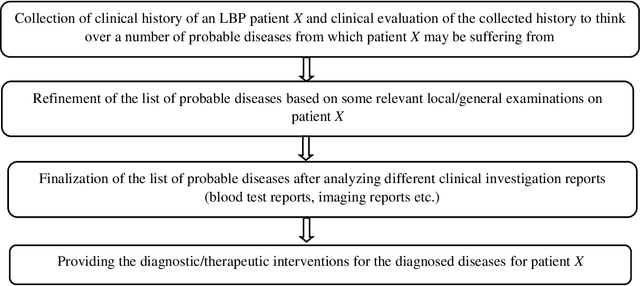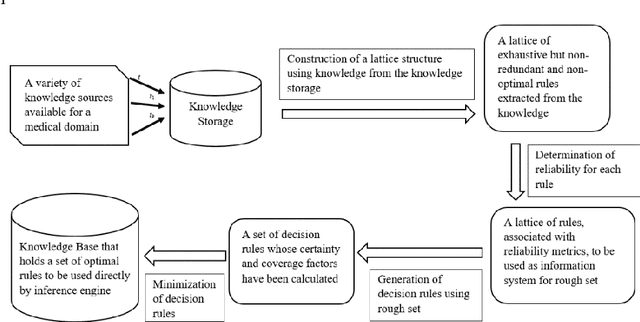Swapan Kumar Basu
Addressing Design Issues in Medical Expert System for Low Back Pain Management: Knowledge Representation, Inference Mechanism, and Conflict Resolution Using Bayesian Network
Sep 09, 2019



Abstract:Aiming at developing a medical expert system for low back pain management, the paper proposes an efficient knowledge representation scheme using frame data structures, and also derives a reliable resolution logic through Bayesian Network. When a patient comes to the intended expert system for diagnosis, the proposed inference engine outputs a number of probable diseases in sorted order, with each disease being associated with a numeric measure to indicate its possibility of occurrence. When two or more diseases in the list have the same or closer possibility of occurrence, Bayesian Network is used for conflict resolution. The proposed scheme has been validated with cases of empirically selected thirty patients. Considering the expected value 0.75 as level of acceptance, the proposed system offers the diagnostic inference with the standard deviation of 0.029. The computational value of Chi-Squared test has been obtained as 11.08 with 12 degree of freedom, implying that the derived results from the designed system conform the homogeneity with the expected outcomes. Prior to any clinical investigations on the selected low back pain patients, the accuracy level (average) of 73.89% has been achieved by the proposed system, which is quite close to the expected clinical accuracy level of 75%.
Rough set based lattice structure for knowledge representation in medical expert systems: low back pain management case study
Oct 02, 2018



Abstract:The aim of medical knowledge representation is to capture the detailed domain knowledge in a clinically efficient manner and to offer a reliable resolution with the acquired knowledge. The knowledge base to be used by a medical expert system should allow incremental growth with inclusion of updated knowledge over the time. As knowledge are gathered from a variety of knowledge sources by different knowledge engineers, the problem of redundancy is an important concern here due to increased processing time of knowledge and occupancy of large computational storage to accommodate all the gathered knowledge. Also there may exist many inconsistent knowledge in the knowledge base. In this paper, we have proposed a rough set based lattice structure for knowledge representation in medical expert systems which overcomes the problem of redundancy and inconsistency in knowledge and offers computational efficiency with respect to both time and space. We have also generated an optimal set of decision rules that would be used directly by the inference engine. The reliability of each rule has been measured using a new metric called credibility factor, and the certainty and coverage factors of a decision rule have been re-defined. With a set of decisions rules arranged in descending order according to their reliability measures, the medical expert system will consider the highly reliable and certain rules at first, then it would search for the possible and uncertain rules at later stage, if recommended by physicians. The proposed knowledge representation technique has been illustrated using an example from the domain of low back pain. The proposed scheme ensures completeness, consistency, integrity, non-redundancy, and ease of access.
 Add to Chrome
Add to Chrome Add to Firefox
Add to Firefox Add to Edge
Add to Edge